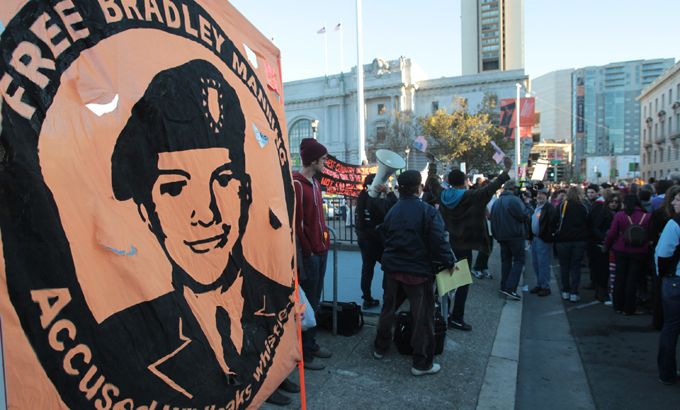
How does the US treat its whistleblowers?
We examine the Bradley Manning case and ask if the new whistleblower protection act will make a difference.
Bradley Manning’s trial is once again postponed. A US military judge says more time is needed to determine whether the US soldier’s treatment while in custody was too harsh. We examine Manning’s case and how the US treats its whistleblowers.
|
“The new whistleblower protection act does a lot of good things but specifically excludes national security and intelligence whistleblowers …. And they are the category of people who are being prosecuted for blowing the whistle and exposing fraud, waste, abuse and patent illegality.“ – Jesselyn Radack, the National Security and Human Rights director at Government Accountability Project |
He is the man accused of the largest ever government document leak in US history. But it took more than 900 days after his arrest for the world to hear from Bradley Manning.
On Thursday, during a pre-trial proceeding, he described the harsh conditions and the psychological trauma he endured while in military custody.
During his time in a military prison in Quantico, Virginia he said he was constantly monitored in his six by eight foot cell, forced to stand or sit on the bunk with his feet on the ground and without any support for his back for most of the day.
Now the military judge has delayed the start of his trial in order to hear more evidence on whether his treatment was unlawful.
The defence is arguing that because of the abuse he suffered, the charges against him should be dismissed. Manning is the most high profile of the many prosecutions brought against whistleblowers during Barack Obama’s presidency.
|
“Way too much is classified, we’ve got to cut down on that …. You’ve got to prove that it harms the interests of the US.“ – Larry Korb, a former US assistant secretary of defence and senior fellow at the Center for American Progress |
His administration has prosecuted more whistleblowers than all other administrations combined – a fact that he campaigned on during his bid for re-election.
However, last week, the administration quietly signed new whistleblower protections into law. President Obama’s supporters say that shows he is taking a sensible approach towards ensuring those who witness wrongdoing are heard.
So how are whistleblowers treated in the US?
To discuss this, we are joined by guests: Jesselyn Radack, the National Security and Human Rights director at Government Accountability Project, who is herself a whistleblower; Chase Madar, the author of the book The Passion of Bradley Manning; and Larry Korb, a former US assistant secretary of defence and senior fellow at the Center for American Progress.
|
“These eleven months of pre-trial solitary confinement were atrocious, it resembles the Soviet psychiatric prisons that political dissidents were placed in and pumped up with drugs because they thought differently. But it’s also not far from the mark of our ‘normal’ federal prisons where we have between 70,000 and 100,000 inmates doing long-term solitary confinement. It has become routinised in the US so … we have a right to be appalled by it but really not to be surprised by it in the US … “Much of the response to Wikileaks in the US has been conditioned on this notion that this is a terrible threat, that we’re on the verge of a precipice to a slippery slope to total transparency where it will be impossible to govern properly. In fact, what Bradley Manning is alleged to have released, the classified material is not even one per cent of what Washington classified last year.” Chase Madar, the author of the book The Passion of Bradley Manning |